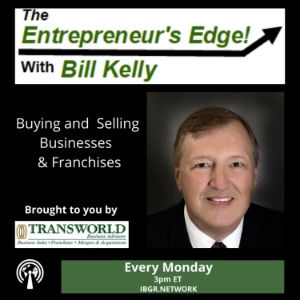
The Entrepreneur's Edge!
Business & Economics Podcasts
Meet your host, Bill Kelly, serial entrepreneur, Senior Business Broker for Transworld of Richmond, and a Commercial Real Estate Agent for our affiliate company Planet CRE.
Over the next 52 episodes we will discuss the best practices and strategies for buying and selling businesses and franchises using the proven methods developed over 45-year by Transworld Business Advisors and hearing from guests and professionals I have the pleasure to work with.
Each episode has additional written information your might find helpful. Here is a complete listing of Show Notes. Want to continue the conversation? Add your thoughts in the comments section available at the bottom of each page of notes on the site. Simply click "read more" and let's get the conversations started!
Location:
United States
Description:
Meet your host, Bill Kelly, serial entrepreneur, Senior Business Broker for Transworld of Richmond, and a Commercial Real Estate Agent for our affiliate company Planet CRE. Over the next 52 episodes we will discuss the best practices and strategies for buying and selling businesses and franchises using the proven methods developed over 45-year by Transworld Business Advisors and hearing from guests and professionals I have the pleasure to work with. Each episode has additional written information your might find helpful. Here is a complete listing of Show Notes. Want to continue the conversation? Add your thoughts in the comments section available at the bottom of each page of notes on the site. Simply click "read more" and let's get the conversations started!
Language:
English
The Transworld Selling Process What to Expect During the Sale Preparation Process with Bill Kelly
Duration:00:12:55
The Transworld Selling Process What to Expect During the Sales Process with Bill Kelly
Duration:00:12:53
Why do Some Businesses Sell Quickly while Others Never Sell with Bill Kelly
Duration:00:12:54
What is Included with The Sale of My Business with Bill Kelly
Duration:00:12:56
Do I Need to Sell my Corporation with my Business with Bill Kelly
Duration:00:12:52
Should I Consider Giving the Buyer a Seller’s Note with Bill Kelly
Duration:00:12:53
Controlling the Sales Process with Bill Kelly
Duration:00:12:56
Negotiating with Potential Buyers with Bill Kelly
Duration:00:12:50
Receiving Offers and Making Counter Offers with Bill Kelly
Duration:00:12:56
What is Due Diligence and why is it Important with Bill Kelly
Duration:00:12:52
Explaining the different types of business closings with Bill Kelly
Duration:00:12:51
What to Expect at Closing When Selling Your Business with Bill Kelly
Duration:00:12:52
Preparing Employees for the Sale with Bill Kelly
Duration:00:12:55
Preparing Key Vendors and Customers for the Sale with Bill Kelly
Duration:00:12:54
Training the New Owner and Providing On-going Support with Bill Kelly
Duration:00:12:51
Review of the Transworld Business Sales Process with Bill Kelly
Duration:00:12:56
Review of Business Sale Documentation Requirements with Bill Kelly
Duration:00:12:55
Review of Services offered by Transworld Business Advisors with Bill Kelly
Duration:00:12:54
Small Business in America with Bill Kelly
Duration:00:12:53
How Can I Start a Business with Very Little Money with Bill Kelly
Duration:00:12:53